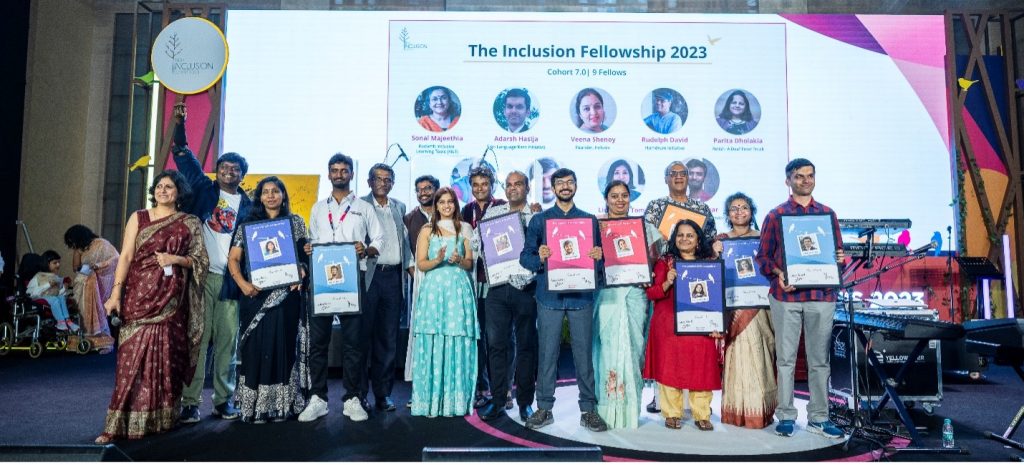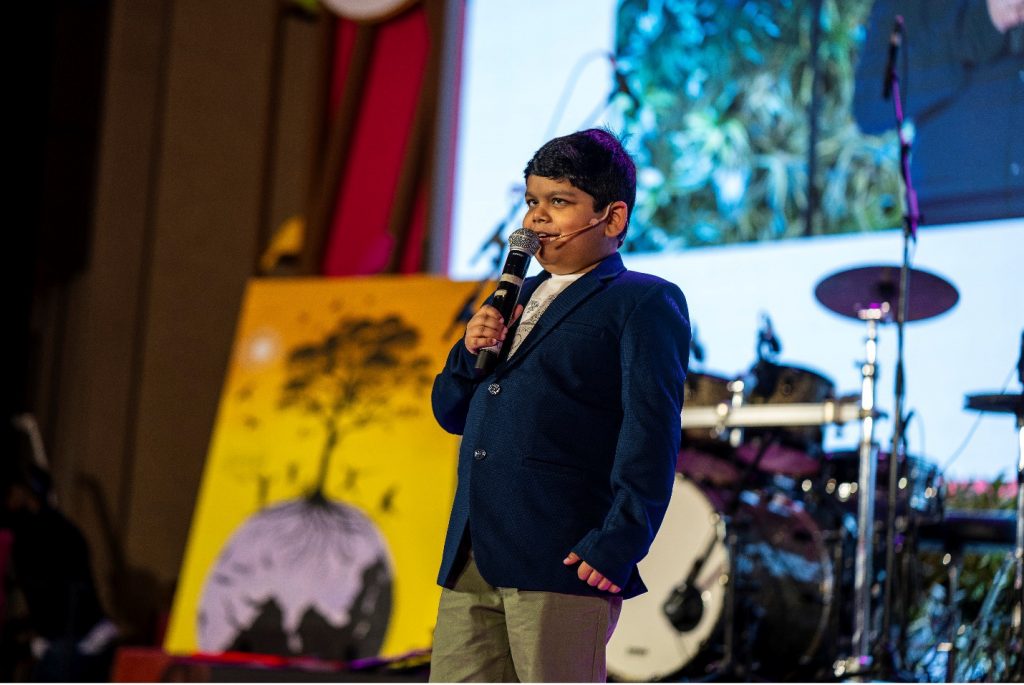IIS is a movement like an orchestra with a maestro at its foundation. It is a movement to include neurodiverse and disabled members in our society and ensure that they enjoy the same equality as everyone else. This orchestra has influenced systemic change in India. However, the team members are not satisfied with this accomplishment; instead, they look to the future with a bigger dream. IIS is such a strong crusader that it could invite litigation with the Oxford English Dictionary over its coined term: dis-ability!
“I attend IIS selfishly for myself,” declares Anshu Gupta in an interview with me, weeks before the event. The founder of one of India’s most charitable organisations has just confessed to selfish motives — was my first thought. The man behind Goonj had encapsulated the essence of the event, but it was lost in translation and could only be grasped after witnessing the marvel of IIS. Now I may assert that I somewhat comprehend what he meant. Believe me, like all profound forms of art it takes time to internalise.
My maiden voyage to IIS was laden with expectations. After shadowing the founder of the event, V.R. Ferose, my anticipation was sky-high. This journey was spanning 15,000 km from LA to Bangalore. It included hours of recorded interviews, each aimed at asking people close to IIS what the essence of this event was. Initially, I questioned whether I had orchestrated an intricate self-sabotage, doubting that anything could surpass what I’d heard. Spoiler alert: it did, effortlessly.
Before I get to the cheese, I want to express gratitude to every individual who graced the stage, making that day truly special. The list includes Joi Barua, Jyothi Kalai, Ritvik Rajan, Augustine Michael Chettiar, Kiran Sahebrao Vinkar, Rahul Damodar Gajjal, Sachin Ramchandra Patil, Ritam Changkakoti, Nilangan Sharma, V.R. Ferose, Prathamesh Sinha, Mohan Agashe, Elizabeth Bonker, Virginia Breen, Pravin Kumar, Anita Nair, Nidhi Mishra, C.K. Meena, Tarun Paul Mathew, Chitra Paul, K.Y. Venkatesh, Nincy Mondly, Ganapathy Subramanian, Anirban Dutta, Rakesh Syam, Sriharsha G.N., Sharath B.D., Kavya Kalur, Prateek Sultania, Rajesh Pandathil, Deepak Mote, Vinay Kambappa, Keya Hatkar, Monisha Hatkar, Adil Hussain, Shekhar Naik, Tanya Abhay Pradhan, Arun Sreekumar, R. Raman, R. Lakshmanan, Gulraj Singh, Darshan Doshi, Jarvis Menezes, Ralph Menezes, Nyzel D’lima, Paroma Dasgupta, Ashish Saksena, and Narendra Kamat.
Now, for the uninitiated, let me try to explain the magic that took place at the 11th edition of IIS. As an outsider looking to become a part of this volunteer family in future, consider this a heartfelt pitch to join. IIS confronts exclusivity with a well-crafted structure, its essence divided into four vital sections: Music and Performance, Leaders from the Movement, The Inclusion Fellowship, and Empowering Talks.
For Music, Art and Performance, the stage becomes a roulette of talent. As musicians, artists, and performers descend, there is music echoing throughout the day, infusing the event with pulsating energy. The atmosphere is vibrant and alive as the artists excel. The painters are responsible for a gorgeous Art Exhibit. Each work is given a platform. It is special to witness people standing and admiring the art. A team of Sign Language interpreters covers every performance. Forcing you to see the impact of truly inclusive thought and how simple it can be to strive for.
Leaders from the Movement, the many courageous pathbreakers of the community stepping forward to share their stories, working towards changing the status quo. Their narratives serve as guiding lights, illuminating a path to follow, for others facing similar obstacles, teaching them resilience and heroism through their pursuits. You feel a power in the room, seeing evidence of what it feels like to have a clear view of your purpose in life.
The Inclusion Fellowship, a distinctive facet of IIS, utilises the platform to propel start-ups in social entrepreneurship. It’s a commitment to fostering a more inclusive India, providing support and momentum for missions dedicated to breaking barriers and promoting diversity. Ideas on stage are supercharged by the simple means of platforming, allowing it to become a movement in the future.

Empowering Talks is where a diverse array of voices of all genders converges, engaging in conversations about the power of giving more and judging less. From authors to actors, poets, artists, and writers, they all contribute to the narrative of empathy and understanding.
There are four people I would like to mention who affected me deeply. Not in any particular order. Let us begin with Prathamesh Sinha, our host for the evening. A savant of stage presence and public speaking with a lovable sense of humour, Prathamesh The First says, “For regular folks, people believe them first, then they have to prove themselves; people like us have to prove ourselves first, then people believe us.” His perspective is especially relevant and crucial to the mission at IIS. At eleven years old he has found himself, and will only become even more unstoppable with time. See you in the movies, champ!

Elizabeth Bonker is a singer, innovator, entrepreneur, and an inspiration. Founder of Communication 4 All, her voice through typing and technology has travelled around the world. She and her team are committed to giving a voice to everyone. The song she wrote about a lesser educator from her past who didn’t believe in her is the perfect hit-back at people limiting your potential. She rejected the notion of limiting herself, going on to achieve what she was destined for. IIS is her partner in thought, execution and tenacity.
Next up is Tarun Paul Mathew, a humanitarian, writer, and thinker. His views illuminate the room. I was lucky that my question got to the stage and by some miracle he answered it. I had asked, what is a fundamental factor speeding up the process towards systemic change? His answer: “By listening.” My second question was, “Why do we feel pain?” He said, “Because we are human.” Nothing is more powerful than the empathy of lived experience, and it was an absolute privilege to hear his viewpoint.
The final person is Keya Hatkar. Author of Dancing on my Wheels, Keya is a star. She is twelve years old, with generational wisdom. She spoke so phenomenally well that her words will never leave me. The challenges of her condition, her attitude towards them were beyond moving. Her presence at IIS made the event more special. Keya doesn’t know what giving up really means; she never accepted that. I hope someday all of us can reach close to her strength.
To finish this piece, I would like to try defining IIS. A quote from the conference: “Across the seas, there are no trees where all the birds can rest.” I would describe the India Inclusion Summit as that tree.
Another attempt.
On November 3rd and 4th, the Radisson Blu auditorium in Bangalore becomes a spectacle—a symphony of love. It entwines you in a tapestry of intimate moments, compelling you to delve deep within your soul. It’s like a suspended ocean of love that moves around the room, drowning you in a hug, giving you an education, trusting you with a mission. Even when you reluctantly vacate your seat in front of the sound-stage for the briefest visit to the restroom, you feel its absence. “The transformative power emanating from this room extends beyond its walls, continually changing lives. May it perpetually carry forth its simple yet profound message: Give and feel more in this life than you take and judge.”
Written by Ishan Bhattachaarjee